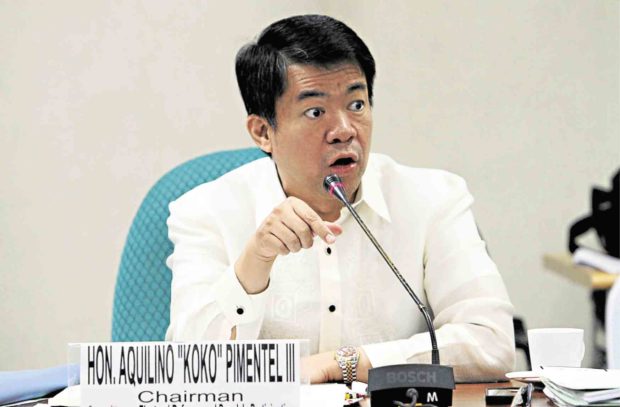Koko Pimentel shrugs off Speaker’s threat, says they’re both for federalism

Aquilino Pimentel III
Give Speaker Pantaleon Alvarez space to say what’s on his mind in pushing for a federal form of government because the Constitution guarantees free speech, Senate President Aquilino Pimentel III said on Saturday.
Coming to the defense of his party mate and coequal in the House of Representatives, Pimentel attributed to Alvarez’s “style of leadership” his threat of a “zero budget” to local officials that don’t support federalism.
The Senate leader and president of PDP-Laban said Alvarez, the party’s secretary general, alone could not control the budget process anyway.
‘Psychologically heavy’
“If others can say that Charter change is dead, let us allow the Speaker to come up with his own psychologically heavy statement. Let him freely speak his mind,” said Pimentel in a radio interview.
Article continues after this advertisementAlvarez had told officials in Iloilo province on Friday that local governments that did not support federalism should expect zero budget from the House. He also called on voters to reject senators who were against federalism.
Article continues after this advertisementRefusing to be drawn into a quarrel with Alvarez, Pimentel said the Speaker’s statements were reflective of his personality. “That’s his style. Let us leave him be,” he said.
‘Give-and-take’
He also pointed out that the budget was a lawmaking process that involved the executive and the legislative branches, with the Senate being responsible for the second review of the budget measure.
“It’s a long process. No one man controls the entire budget process,” said Pimentel. “The budget is a law. It’s give-and-take, just like any other law. But I will respect the right of the Speaker to freely speak his mind.”
Senate leaders are themselves split over a proposed summit to help end the bickering on Charter change that will allow the shift to a federal form of government.
Pimentel said the House and the Senate should talk things over and not shut down all efforts to amend the Constitution.
He said he was looking to meet with Alvarez “in the coming week” so they could have an informal exchange of ideas.
“I am not expecting that it will be finished in one meeting. But in that meeting, there will be informal exchange of ideas and then possibly, I’ll make an appeal that both camps keep an open mind and to exchange position papers to see which party has the heavier legal argument.”
The Senate has always rejected the House’s stand on joint voting in a constitutional assembly (Con-ass).
A House-Senate summit proposed by Sen. Juan Miguel Zubiri does not sit well, however, with Senate Minority Leader Franklin Drilon, who likened it to “putting the cart before the horse.”
Drilon suggested instead that before such a meeting, each chamber should conduct public hearings separately and firm up their respective positions on four issues: the need to amend the Charter and if so, which provisions to amend; by what mode—either a constitutional convention (Con-con) or Con-ass; and how Congress will vote.
Transparency
“Until the issues are settled, I do not see the point of a summit. It might end up with nothing. Transparency and public participation are critical to people’s trust in the process,” he said.
The Senate has picked up an important ally over the manner of changing the Constitution—if it has to.
The board of governors of the Integrated Bar of the Philippines (IBP) on Saturday batted for a Con-con and called on Congress to vote separately on Charter change.
Abdiel Dan Elijah Fajardo, IBP national president, said that the “rigid nature” of the 1987 Constitution is to ensure that the stability of power would remain.
Check and balance
“Major revisions designed to substantially alter the balance of power in government must be proposed by a more circumspect constitutional convention and not by an overweening constituent assembly,” he said in a statement.
“A proposed revision must be set forth by the two houses of Congress voting separately, in keeping with the deliberative nature of our bilateral legislative body,” he added.
Fajardo said that, although the 1987 Constitution was “ambiguous” on Charter change, it was clear on the separation of the two assemblies to ensure check and balance.
“The intent behind bicameralism continues to be check and balance between the two houses, so designed for the enactment of better laws,” he said. —With a report from Julie M. Aurelio